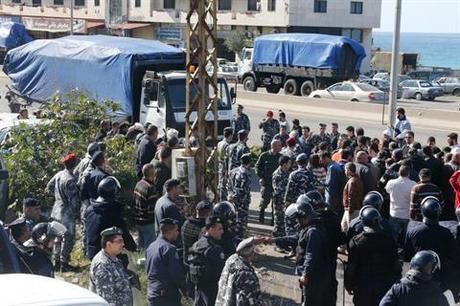
by Elise Knutsen, Jana El Hassan / Daily Star
Activists temporarily suspended their activities at the Naameh landfill Friday afternoon after a police crackdown earlier in the day cleared the way for Sukleen to resume dumping at the site serving Beirut and Mount Lebanon.
At dawn on Friday, hundreds of police removed tents erected by protesters near the landfill. Ajwad Ayyash, an activist, was detained at 8:05 a.m. and released several hours later. Earlier in the day, some three hundred police officers had descended upon the demonstration, activist Ragheda al-Halabi told The Daily Star.
“I’m just an activist. I love my country, I love mother nature. I’m just educating people about the poison of this goddamn landfill,” Ayyash told The Daily Star upon his release, his voice hoarse from agitating.
Soon after Ayyash was released, activists decided to suspend protest activities, at least for the coming days.
“We basically took a decision to refrain from any confrontation with the police, but to maintain our right to take action later on,” activist Mark Daou said.
Still, Daou says the battle over Naameh landfill is far from over.
“Fifteen days after the formation of the government we will take to streets again if our demands are not met,” Daou told The Daily Star.
Specifically, said activist Melhem Khalaf, the protesters want the landfill to be used for only biodegradable waste as stipulated in the agreement with Sukleen, the private company contracted to sweep and clean the streets of Beirut and Mount Lebanon.
The activists, Khalaf added, also want the government to create a monitoring committee consisting of representatives from civil society and the affected municipalities.
Protesters have been blocking the access road to the Naameh landfill on and off since Jan. 17, repeatedly bringing trash collection in Beirut to a standstill.
The road, however, was opened during the police raid early Friday morning.
Sukleen resumed its operations in Beirut and Mount Lebanon Friday and garbage trucks were passing through the access road uninhibited Friday afternoon under the watchful eye of the Internal Security Forces.
The crackdown comes after MP Walid Jumblatt vowed Thursday to close the controversial Naameh landfill by 2015 and that his National Struggle Front parliamentary bloc would find alternatives to the dumping ground and follow up on the file until the formation of a new Cabinet.
Protesters said they welcomed Jumblatt’s initiative but still sought assurances that their demands to relevant authorities and the Council for Development and Reconstruction would be respected.
“We thank the statement issued offering a solution but the initiative is lacking … political vows are not enough for us, we need written assurances from the relevant authorities that the landfill will be closed next year,” Bassam Kantar, a spokesperson for the protesters, said.
“The caretaker Cabinet can handle the issue and give us the vows we need now. Why do they want to keep the file pending until a new government is formed?” he asked.
However, others were skeptical of Jumblatt’s pronouncement.
“He’s just talking [for the sake of talking],” said Sara, a student activist whose family hails from the Naameh area. “I think Walid Jumblatt always follows the money,” she added.
Residents in the nearby areas have complained for years that the dumping ground was being filled beyond its capacity and ruining the environment as well as making residents sick. Many suspect that a slew of recent cancer deaths in the community are related to toxic waste in the landfill.
Student activist Sara, whose family hails from the region, says her cousin Khaled died of cancer last month at the age of 22. She blames toxic waste from the landfill which has seeped into the soil and tainted locally grown crops.
“We are dying,” said Jaber Ayyash, who also said he was worried about the health of his family living nearby. “If they [the police] kill me now, what will change? Nothing, because I’m dying,” he said.
However, If Beirut is feeling reprieve from the rubbish build-up, residents of Naameh are not. A paint-can could be seen bobbing in a creek near the landfill; a broken fluorescent light bulb run aground nearby.
“It’s not safe for us,” Sara concluded. “We are suffering from all this pollution and garbage.”

